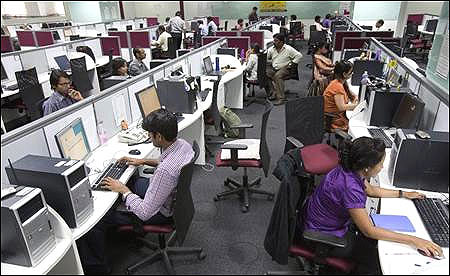Photographs: Reuters Rajarshi Bhattacharjee
Infrastructure and accountability assume centre stage as organisations reach out to talent across geographies, writes Rajarshi Bhattacharjee
It's another Monday morning.
You roll out of your bed sharp at 7.00.
Commute to the next room in your house coat and fuzzy slippers.
Turn on the laptop instead of the car ignition.
Work for the next eight hours straight, grabbing a bite along the way.
No rushing out of the home, no stop-start traffic, no immaculate chic.
The prize: Save thousands of bucks on travel expenses.
The image is for representation purpose only
. . .
Remote workers: Here's how companies manage them
It's happening.
Though not exactly a new phenomenon, remote working -- professionals working from any place other than their offices -- is now becoming almost routine as more and more companies look at it not just as a tool to cut operational costs but as a means to retain employees and offer them a better work-life balance.
First adopted by companies in the domain of IT/ITES, advertising, software, off-shore contracting, consulting and human resources, flexibility is now a sine qua non of smart organisational practices.
While remote workers make up of a huge chunk of India's workforce, current cost-cutting trends suggest that this trade of office cabins for cyber cafes and dining tables will continue.
. . .
Remote workers: Here's how companies manage them
Indeed, many companies see remote work as a significant perk they can offer their employees in the competition for top talent.
But how does an organisation keep a remote team on the right track and in line with the company and team needs?
How does the human resource manager ensure the flexi-worker is not slacking off while everyone else is busy working?
Above all, how do you help remote employees really feel they are an essential part of the team?
There are no one-size-fits all answers to these questions but one can draw important lessons from the experiences of companies -- such as Philips, CISCO, SAP Labs India and Motorola among many others -- that are trying to institutionalise work-from-home or remote working.
The image is for representation purpose only
. . .
Remote workers: Here's how companies manage them
"The challenge here is infrastructure and accountability," said Marc Effron, author of One Page Talent Management:
Eliminating Complexity, Adding Value, and CEO, The Talent Strategy Group, in an earlier interview to The Strategist.
"Remote employee management skills are essential to thriving in today's virtual work environment, but the old methods simply don't work.
So put in place the infrastructure to make that work."
The key enablers
The first thing in making a remote arrangement work is making sure the remote employee knows what is expected of him or her.
"Cisco offers remote working across the board as long as the employees are able to deliver work results expected out of them," says Seema Nair, head, HR operations, CISCO India.
. . .
Remote workers: Here's how companies manage them
Photographs: Reuters
"Schedules are drawn up within teams for working remotely, taking into consideration work pressures.
In fact, there are some functions such as product development, marketing etc that lend themselves better to remote working than functions such as admin etc which inherently requires more face-to-face interactions."
The next thing is to ensure the employee has the right tools to stay connected.
CISCO, for instance, has a comprehensive portfolio of solutions to help extend the office network and allows a telecommuter to work from any location.
These solutions offer easy and secure access to the company's business data, phone system, applications and resources through secure, wired, wireless, and high-speed Internet connections.
The image is for representation purpose only
. . .
Remote workers: Here's how companies manage them
Photographs: Reuters
At IBM, workforce flexibility is seen as a competitive advantage.
The company has developed a global guide to mobile work to help employees and managers stay connected, perform effectively in mobile environments and respond quickly to changing needs of customers and employees.
To this end, the company has developed connectivity tools such as Same Time (an IBM chat tool), Beehive and team-based tools to increase efficiency.
Says Surbhi Mathur Gandhi, senior vice-president, TeamLease Services, a staffing solutions firm, "With cloud computing coming into play, information, data and work related details have become a lot more open and interactive today improving the accessibility of a remote employee to his/her organisation."
The image is for representation purpose only
. . .
Remote workers: Here's how companies manage them
Photographs: Reuters
Many operational softwares are web-enabled that allow a remote employee to source data as well as upload his/her work on a company's portal or server and log on to the next level of logistics.
"We are poised to see this to spread across to many other industries (outside of IT/ITES) that have previously restricted data or information access."
If technology is an essential enabler that needs to be in place before an organisation allows employees to work from remote locations, the important enabler from the employee's point of view is empathy.
Yashwant Mahadik, vice-president and head, HR, Philips India, says this second enabler is more of a psychological or an ethical enabler, which is about employers understanding the principals behind allowing this.
. . .
Remote workers: Here's how companies manage them
Photographs: Michael Caronna/Reuters
There are specific circumstances under which Philips employees are allowed to work from home or any remote location.
The company's managers are trained accordingly and know the objective behind the guidelines.
Employees who avail of this opportunity are also given a complete low down on the dos and don'ts.
"At Philips, the guidelines and principals are clear and the objective is to ensure work-life balance of employees, given the new social and ancillary challenges posed on the young talents today."
For Philips remote working is also about increasing the count of women in its workforce. "When you have a diverse workforce, it is important that the organisation has to be sensitive to their needs," Mahadik says.
. . .
Remote workers: Here's how companies manage them
"This is also about putting faith and trust in your human resources -- developing trust by beginning to trust employees," says Mahadik.
In short, developing structured guidelines for managing and assessing remote employees is imperative.
Philips India, for instance, doesn't want to make remote working a regular feature, but allows it on a case-by-case basis.
CISCO relies on its structured performance management model and personal development plans to measure key results; SAP Labs India has a policy that allows employees to work from home one day a week.
"Alignment with business is necessary to ensure continuity does not get affected.
. . .
Remote workers: Here's how companies manage them
"There are always certain departments or small teams that may not have the flexibility or the appetite to implement such policies.
"Also, managers need to trust their employees when they work from home and not feel they are misusing such benefits.
Hence buy-in from managers is very important in building and rolling out such a policy," indicates Bhuvaneswar Naik, vice-president, HR, SAP Labs India.
All in the cloud
Then there are companies like management and HR consulting firm, PeopleSys, which is on an expansion spree across the country and beyond, having employees reporting from remote locations.
. . .
Remote workers: Here's how companies manage them
Photographs: Reuters
"We want people to work from remote locations because it is convenient and our all sensitive data are secure," shares Gurunandan Savnal, managing director, PeopleSys.
The company's entire customer relationship and sales management is on the cloud -- client meetings and team meetings are preferred on audio-visual conferences irrespective of locations.
"If any of my team member from any location updates some information or data somewhere in our cloud platform, I am updated of the same and assign the deal to someone and that person actually finds it right on his/her screen instantly.
"I can get in touch with my team, all together, irrespective of how far they are, have audio-visual meetings with more than 20-25 people at the same time, and share all that we are doing," says Savnal.
. . .
Remote workers: Here's how companies manage them
Photographs: Caren Firouz/Reuters
Savnal also points at the need to address some of the other key challenges that most companies face while allowing employees working from home or other locations -- information security, lack of spontaneity and motivation arising from absence of physical proximity, assessment structure and corporate image management.
Most remote professionals see their company through the prism of their laptops. "This may sometimes create a distorted view of the company and what it stands for.
"Their actions thus are dictated by this company image.
"As such, the company should plan the on-boarding of such professionals in a strategic manner and periodically 'enculturise' the remote professionals -- on what the brand stands for, the values and the culture of the organisation," adds Savnal.
The image is for representation purpose only
. . .
Remote workers: Here's how companies manage them
Photographs: Reuters
CISCO's Nair agrees with Savnal on most of these counts.
"Absence of external motivation is a potential roadblock that our employees tend to face in such a scenario.
"This is especially true for employees who have had the experience of working in a team -- they might feel isolated and miss the interaction with co-workers," says Nair.
Mahadik of Philips India says ultimately the success of this relationship rests on the maturity of employees and the trust between the employer and the employee.
He says, "Initially, the big challenge Philips faced was to make employees understand how to execute the whole thing with maturity. Over a period of time, we gained some key insights.
The image is for representation purpose only
. . .
Remote workers: Here's how companies manage them
"It started to become a regular feature with some employees. So we actually had to sit down with them and have and ask whether they were looking at a work from home option or were they are looking at a part time job."
Assessment is difficult
Assessment of remote employees is another area where a lot of HR time is being invested.
At SAP Labs, the strategy is streamlined: clear deliverables, high intensity communications with remote employers on how goals are to be measured, and a sense of trust and good working relationship between the manager and the remote employee.
. . .
Remote workers: Here's how companies manage them
Other aspects include: quality of work done -- rework, first-go-through rates, failure rates etc can be calculated depending on the assignment of the professional.
This data can be collected over time and feedback given periodically to improve performance.
While KRAs are important, it is critical that it is done by conforming to the laid down process or standard operating procedures.
How important is face time in all this?
In the regular office environment, the HR manager might pop in at the coffee machine to chit-chat with the employee.
Some managers are naturally like that but there are managers who would happily sit inside their offices and manage.
. . .
Remote workers: Here's how companies manage them
Photographs: Rediff Archives
The classic challenge is here: if I'm thinking about someone for promotions, who is going to come to my mind readily?
Is it the brilliant flexi worker that I have or is it someone whom I see every time inside the office and I'm a little bit more comfortable with?
Effron of The Talent Strategy Group has a simple advise, "Get down to the absolute basics in performance management: fundamental goal setting, coaching and moulding employees.
"Tell everybody about the goals openly and hold them accountable for it."


















article